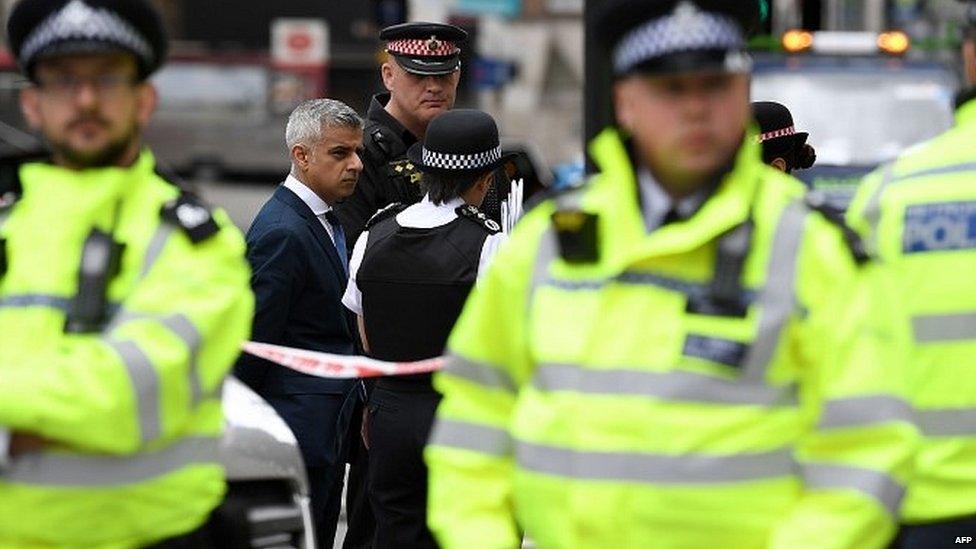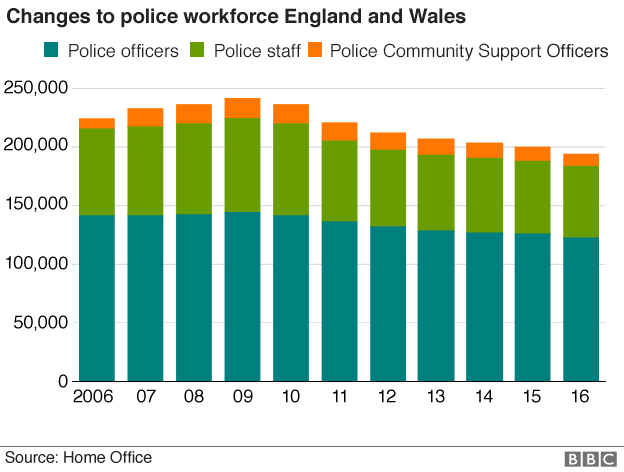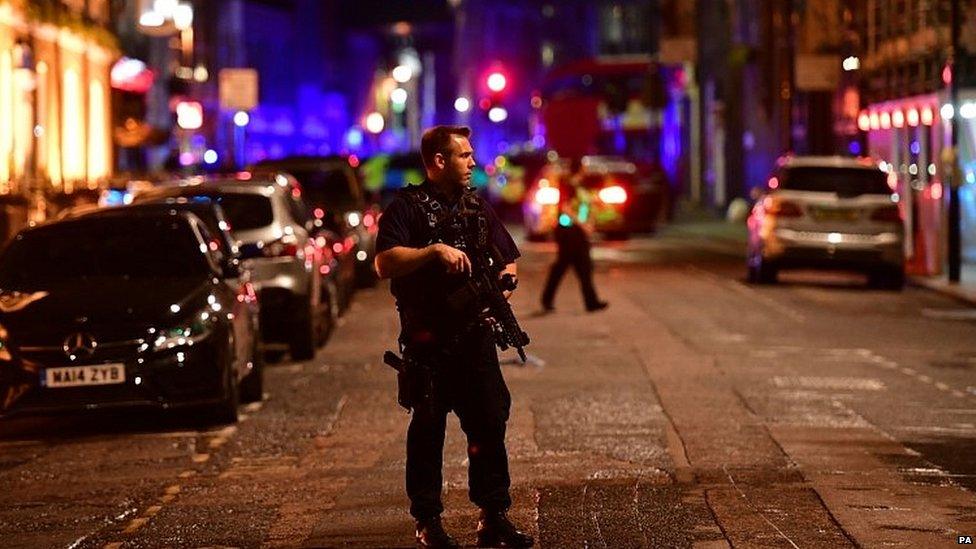General election: Tories and Labour in police funding battle
- Published

Labour has warned that cuts to police numbers are a danger to the public as security dominated the penultimate day of the general election campaign.
London Mayor Sadiq Khan said the Met Police faced an "unsustainable" £400m budget squeeze, risking 12,800 officers and making it harder to foil attacks.
Theresa May insisted the UK's largest police force was "well-resourced".
But the prime minister said she would consider new powers in response to the "increased tempo" of terror incidents.
And Foreign Secretary Boris Johnson told Sky News that the police and security services would have "questions to answer" about whether more could have been done to track and detain the three men behind the London Bridge attacks, one of whom was the subject of a 2015 police investigation.
Met Commissioner Cressida Dick has said a debate is needed on future resources in the wake of the London Bridge and Westminster attacks although the prime minister said the UK's most senior police officer had made it clear her force had "very powerful" counter-terrorism capabilities.
The foreign secretary tells Today Conservatives are putting more money into counter-terrorism
The BBC's assistant political editor Norman Smith said that while the prime minister was keen to talk about other issues, such who was best-equipped to lead the imminent Brexit negotiations, the issue of police numbers continued to "dog" her.
Labour has accused her of "letting austerity damage" security by allowing total police officer numbers to fall by nearly 19,000 while she was home secretary.
Mr Khan said the Met, for which he has direct responsibility, was a "brilliant force" but had already had to swallow "big" budget cuts since 2010 and he was now "deeply concerned" about the effect that a further spending squeeze could have on policing in the capital.
The Labour politician said, under current Conservative plans, the Met faced having to make savings of £400m in the next few years.

If all of these savings came from reduced police numbers, he said the force faced a reduction in staffing of between 10% and 40% - equivalent to losing between 3,400 and 12,800 police constables.
He also warned that the Met could lose between £184m and £700m in further funding a year due to changes to the national police funding formula. He told BBC Breakfast that thousands of community police officers, the "eyes and ears" of the force, were now under threat.
"It is not sustainable," he said. "One of the first things that I did as mayor of London was to approve a further 600 armed officers as I recognise that having a significant number of armed officers is one of the ways of preventing terrorists causing further harm to our city."
Asked whether he believed that London would be less safe if the Conservatives were re-elected, he replied: "Under a renewed Theresa May government, we would have fewer police officers... there is no doubt that fewer police officers mean we are in more danger."

The Tories say armed police officer numbers are on the rise but Labour insist levels remain lower than in 2010
The Tories say armed police numbers are increasing, after falls since 2010, and officers had extra powers to deal with terrorists.
Mr Johnson said while he was mayor he and the then home secretary Theresa May had maintained overall police numbers in the capital at about 32,000.
"The number of police officers in the capital city has remained high," he told BBC Radio 4's Today programme. "It is up to the mayor of London, if he chooses, to spend more on policing and to keep numbers high. What we did was reorganise the police in London so as to put more officers on the front line."
Lib Dem leader Tim Farron tells Today TPims are "far more effective" than control orders
He insisted the Conservatives were protecting overall police budgets and hiring a further 1,900 security service officers, suggesting that Labour's focus on "so-called cuts" was distracting attention from the actions of the London Bridge attackers.
"When you look at what the police did on Saturday night, not only getting to the scene so quickly but dispatching those scumbags within eight minutes, most people would pay tribute to the work of armed officers."

Analysis by BBC political editor Laura Kuenssberg
The Labour Party has, to use the terrible jargon, had "cut through" with its attempt to tie security and austerity together as one campaign issue - citing police cuts as making us less safe.
Labour candidates say there is public awareness and anxiety about this, particularly in the wake of the London Bridge and Manchester attacks.
Conversely, while the Tories had been frustrated that Jeremy Corbyn's attitudes on security have played less prominently in the campaign than they had expected, the new focus on security means Theresa May faces increased scrutiny - but it may also, as last week's Question Time suggested, put more seeds of doubt in voters' minds about Mr Corbyn.
Senior Tory figures today believe it could help the vote "crystallise" back to them in this vital final 48 hours.
We'll see - but what has been, at some of the last events of the campaign, a political hindrance might, in the privacy of the polling booth, be a big help.

But Mr Johnson later told Sky News that there would be a focus on whether more could have been done after one of the attackers, Khuram Butt, featured in a 2016 Channel 4 documentary about extremists.
Rudd: UK can't stop all terror attacks
"People are going to look at the front pages today and they're going to say, 'How on earth could we have let this guy or possibly more through the net?'
"That is a question that will need to be answered by MI5, by the police, as the investigation goes on."
Asked, on a visit to Stoke-on-Trent, if she believed there had been intelligence failures, the prime minister praised their efforts but said she expected the police and security services to "look at their processes" after completing their current investigations.
In other interventions, UKIP leader Paul Nuttall said extending the power to detain terror suspects without charge from 14 to 28 days should be considered.
And former Lib Dem leader Nick Clegg has defended spending cuts agreed by his party during the coalition government, arguing the decision to ringfence NHS and school budgets between 2010 and 2015, which left other areas disproportionately affected, was "understandable at the time".